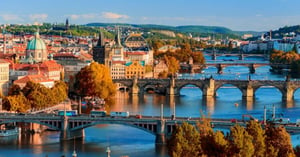Prague, the capital city of the Czech Republic, has been known during its renowned history as a magnet for commercial, cultural, scientific and political activity. This thriving city, also known as the City of a Hundred Spires, is home to more than 1.2 million people and generates an estimated 25 per cent of the Czech Republic's GDP. With its enchanting architecture, visual charms and historic landmarks, Prague is listed as a Unesco World Heritage Site.
If we could travel back in time to visit Prague in the 14th century, we would see builders constructing the Charles Bridge across the Vltava River to connect the city's Staré Město (Old Town) with Malá Strana (Lesser Town). Fast forward to the 21st century and we observe Prague striving to build a new type of bridge. As this article reveals, it is a bridge of urban transformation connecting today's city to a smart city future.
Prague's Smart City Strategy
Prague's strategy of transformation—including technology-centric and human-centric themes—is wide-ranging and ambitious. The strategy is described from multiple vantage points in the city's Strategic Plan (2016 Update), Metropolitan Plan and Smart Prague website. In developing the Strategic Plan, six expert groups addressed social cohesion, culture and creativity, economic development, urban infrastructure, the environment and city governance. The Strategic Plan articulates a vision of sustainable development to the year 2030 and serves as a guide for urban policies, research and innovation.
The new Metropolitan Plan, released this year by the city's Institute of Planning and Development (IPR), presents a set of guidelines for the coordinated development of new housing and infrastructure and the prevention of urban sprawl. To establish a dialogue with citizens on this conceptual plan, the IPR conducted an informational tour throughout the city.
Prague's smart city concept—known as Smart Prague 2030—involves plans for technology innovation, knowledge sharing, digital solutions and services and modernization of city operations. Smart Prague planning embraces strategic priorities where technologies are expected to have the greatest positive impact on quality of life:
- Mobility of the future
- Smart buildings and energy
- Waste-free city
- Attractive tourism
- People and the Urban Environment
- Data space and platform

“The example of Smart Prague shows that a clear, purposeful and long-term oriented strategy is needed to successfully transform a city into a truly smart city. Technology is utilized as an enabler for transformation, but the overall purpose is that solutions transform into benefits for the stakeholders - especially the citizens of Prague”, recognizes Bart Gorynski, Managing Partner of bee smart city.
Prague's Smart City Projects
To plan and develop Smart Prague projects, the city established a Smart City Project Office managed by Operátor ICT, a municipal company with responsibilities to solicit ideas from citizens, municipal districts and other stakeholders; establish a process for smart city project reviews; evaluate financing options, and coordinate the implementation and promotion of projects.
According to Vladimir Antonin Bláha, spokesperson of the Operátor ICT, proposed smart city projects emanate from Smart Prague 2030 and must be linked to a strategic priority. Bláha says that proposed projects are evaluated based on expected benefits, feasibility and consideration of how similar projects have fared in Europe and other parts of the world. An online application allows citizens to submit their ideas for smart city projects. Some projects are launched as pilots. This enables the testing of smart city solutions on a limited scale before implementing them at the city level. Soon, the city plans to introduce a Smart City Index with 150 indicators to use in the evaluation of project proposals.
Operátor ICT is implementing technologies to improve the quality of life of Prague citizens and the management of local government services. These projects include initiatives in public transport, big data, analytics, electric vehicles and energy. Examples of Smart Prague projects include:
- My Prague: a mobile application providing user-friendly access to information about the city including healthcare facilities, parking spaces, municipal offices, cultural events, playgrounds and parks and waste collection centres.
- Smart lighting: a network of sensors installed on public lamp posts to improve public safety; reduce the costs of lamp maintenance; and collect data on noise levels, temperature, pollution, smart waste containers and smart parking meters.
- Intelligent mobility: a new system for the Prague Public Transit Company to enable optimization of tram and bus traffic (based on passenger needs), improving communications with drivers and delivering transit information to passengers.
Improving the quality of life through intelligent mobility is one of Prague's key priorities. Adriana Krnáčová, Mayor of Prague, states in a recent article that the city "has a very good and dense public transportation system, which even visitors from Western Europe often praise". Mayor Krnáčová says Prague intends to build upon its transport strengths by increasing battery charging infrastructure and modernizing the public transport payment system.
Not all of Prague's quality-of-life initiatives are dependent on digital technologies. A biotope pond and adjacent lawn in Lhotka (Prague's District 4) provide the natural setting for a new open-air swimming pool. The biotope pool relies on plants, algae and filters to sustain water quality. As Petr Štěpánek, Mayor of Prague 4 explains: “We chose the biotope because its ecological operation does not require chemicals. Our environment is already burdened by different chemicals, many people suffer from allergies, so we did not want to build a tiled pool full of chlorinated water.”
Success Factors: Cooperation, Innovation, Knowledge Sharing
Implementing a smart city strategy in the Czech Republic entails complex issues, some of which linger from the evolution from a socialist system of state-controlled planning to a modern market-driven process. In Prague, today's issues include how to build trust in urban planning, preserve historical and cultural value, ensure social and digital inclusion, manage urban sprawl and provide sustainable infrastructure.
Confronting these issues requires cooperation in urban innovation and knowledge sharing. As described by Mayor Krnáčová: "Cooperation between the public sector, schools, citizens and companies is very important to us. To generate results, Prague needs to create the right conditions, develop the infrastructure and connect the creative part with the business community."
Operátor ICT is committed to knowledge sharing and cooperation with public administrations, private sector entities and universities involved in modern technologies. As an example, Operátor ICT is cooperating on the design of a new virtualization system with local partners and research institutions including the IPR, the Czech Institute of Informatics, Robotics and Cybernetics; the Czech Academy of Sciences; the Czech Technical University; and municipal companies and state-funded institutions.
Prague's cooperative and knowledge-sharing activities also include a collaborative planning platform, a consumer forum and participation in the EU Triangulum consortium.
Collaborative Planning Platform
UrbanACT, an initiative with the slogan "Act for Your City", has organized public lectures and workshops to increase awareness of urban challenges in Prague, bring an international dimension to urban planning activities and encourage cooperative solutions. UrbanACT is a component of ReSITE, a global non-profit established to improve urban space by providing a platform upon which policymakers, urban innovators, designers, citizens and architects can collaborate, share ideas and solve problems holistically.
Consumer Forum
Prague's Spotřebitelské Forum was established as an umbrella platform to facilitate communication between citizens, civic associations, companies and consumer organizations in the city. Kryštof Kruliš, Chairman of Spotřebitelské Forum, says the forum believes "cities should engage civil society and communicate on preferences in smart city projects. While smart city project possibilities are many, the fact is that resources are limited. This is why cities should have good data on what is necessary and knowledge of end-user opinions. One way to do this is through close cooperation with consumer organizations who can provide useful insights." The Spotřebitelské Forum is preparing to conduct a series of interviews with consumer organizations to identify issues on how digitization affects everyday life.
Triangulum Consortium
Prague is a partner and follower city in the Triangulum consortium, one of Europe's H2020 Smart City Lighthouse Projects established to "demonstrate, disseminate and replicate solutions and frameworks for Europe’s future smart cities". Triangulum's partners from municipal government, industry and research entities are designing and developing smart flexible solutions in flagship cities which can be replicated in Prague and other follower cities to address unique urban requirements.
A Bridge to the Future
Setting and pursuing ambitious goals is not new to Prague's institutions and citizens. The city has an enviable reputation and history of creativity and research at the frontiers of science and is known as an important centre of innovation, with numerous institutes of the Czech Academy of Sciences, digital and industrial companies, an entrepreneurial ecosystem and major universities performing research and development.
In addition to the preservation of Prague's architectural value, distinctive cultural attractions, and flourishing business and academic communities, its citizens and visitors can expect a smart city future with a high quality of life.
Smart Solutions Improve Livability and Prosperity
As the example of Smart Prague shows, a clear and long-term strategy aimed at the improvement of economic prosperity and quality of life is needed to successfully transform a city into a truly smart city. Collaboration and citizen-centricity are key elements of a strategy that leverages solutions sustainably.

“At the heart of every smart city strategy lies the question on how it is executed in the form of citizen-centric smart solutions to solve urban challenges and to seize development opportunities. Building and nurturing the ecosystem of smart city solutions is key to success”, says Thomas Müller, Managing Partner of bee smart city.
Connect, share and learn via the global smart city network
Join the free global smart city network and community to check out best practice solutions implemented in cities around the globe and to connect with thousands of peers and experts in the smart city domain. Exchange solutions, ideas and lessons learned in the global smart city community.


